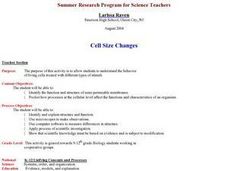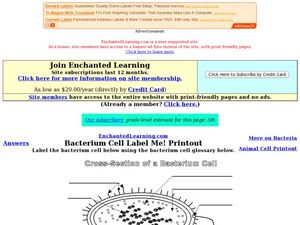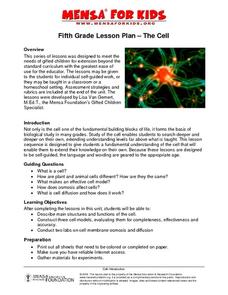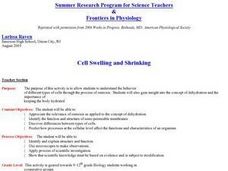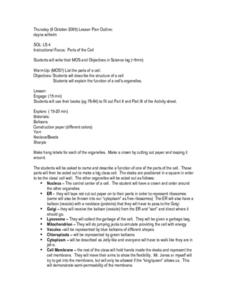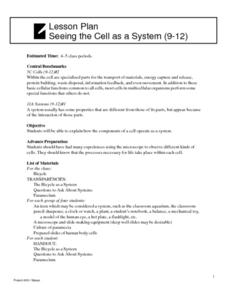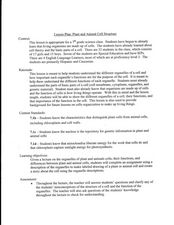Curated OER
Cell Size Changes
Students examine the behavior of living cells treated with different types of stimuli. They watch an online movie, examine wet mount slides under a microscope, take an online quiz, and analyze data.
Curated OER
Bacterium Cell Label Me!
In this labeling a cross-section of a Bacterium cell worksheet, students use the glossary of Bacterium cell terms to help identify and label each cell part. Students label nine parts of the Bacterium cell.
Curated OER
Observing Specialized Cells
In this plant and animal cell worksheet, students draw five examples of plant or animal cells that are specialized to perform a particular functions. They also complete 6 short answer questions based on their observations.
Curated OER
The Cell
Tenth graders explore the parts of a cell. In pairs, classmates construct a model of a eukaryotic cell, detailing its morphology and function. With the use of computer technology, 10th graders create cell book for middle schoolers. ...
Curated OER
Cell Me What?
Young scholars compare and contrast the characteristics of robots and cells. For this biology lesson, students examine the parts and function of cell organelles. They create a visual representation of their cell/robot analogy.
Curated OER
Edible Cells
Eighth graders construct edible models of a plant cell and an animal cell and state the functions of the organelles. They are to write a short sentence describing the function of each organelle.
Curated OER
Cell Types
Fourth graders create cartoon characters which compare and contrast two types of cells: nerve and muscle. Cartoon characters show how these two cells are similar, how they are different, and the relationship between the two cell types.
Curated OER
Cell Cookie Lesson Plan
Students review the structure and fuctions of plant and animal cells. They use various types of materials such as sugar cookies and cake frosting for this activity.
Curated OER
Cell Swelling and Shrinking
Students examine the concept of osmosis in relation to dehydration. They identify the function and structure of semi-permable membranes. They predict how certain processes can affect the characteristics of an organism.
Curated OER
Hands-on Cells
Students review the components of a cell and the differences between plant and animal cells by creating a three-dimensional model of each type of cell. In small groups, they use modeling clay and household object to construct their models.
Curated OER
Parts of the Cell
High schoolers examine plant and animal cells to observe the organelles present in the cell, to match the function of each to the organelle on a cell model and to build a model of the plant or animal cell.
Curated OER
Seeing the Cell as a System
Students explain how the components of a cell operate as a system. Students examine a bicycle and find out if parts were arranged differently, could the system still be carried out. They look at cells as well and see what function they...
Curated OER
Plant Structure, Function and Growth
Students study three structures of a plant as well as their locations and functions. In this botany lesson students complete several activities on plant organs and their functions.
Curated OER
Cell Growth and Division
Students explore the cell cycle. They examine why the cell cycle is necessary. Students discuss the processes of interphase and mitosis. They explore the general phases of mitosis; prophase, metaphase, anaphase and telophase.
Curated OER
Why Are Cells So Small?
Students examine the relationship between cell surface area and the ability of materials to diffuse through a cell. They participate in an experiment in which they determine which materials diffuse easier than others. They complete...
Curated OER
Cell Cycle Duration
Students examine the cell cycle and how its duration can vary. In this cells lesson students complete a worksheet and answer questions.
Curated OER
Comparing Mitosis with Meiosis
Life science learners view an online animated mini textbook comparing two types of cell division. Working in groups, they use a digital microscope to capture images of cells in different stages of mitosis and meiosis. Then they create an...
Curated OER
Cells, The Structural and Functional Units of Life
Students observe the general structure and organelles of plant and animal cells. Students prepare microscope slides of elodea, onion, check, and cork and identify the cells by size and shape as unicellular, multicellular, plant or animal.
Curated OER
Plant and Animal Cell Structure
Seventh graders identify the different parts and functions of the cell. For this biology lesson, 7th graders make a labelled diagram of either a plant or animal cell. They write a story about it.
Curated OER
Nervous System
Are you nervous about teaching the nervous system to your beginning biologists? Worry no more! This PowerPoint provides a note-taking guide and diagrams of the neuron and the brain. Viewers will walk away with a clear understanding of...
Curated OER
Are Fruits And Vegetables Really Made of Cells?
Students design and carry out an exercise to determine if a given fruit or vegetable is composed of cells. They dissect out sections of the fruit or vegetable, prepare stained slides, and make observations under a compound microscope.
Curated OER
Cell Cycle Movie
Fourth graders draw on previous knowledge and create hand-held flip books that show a cell going through the motions of the cell cycle. They create a flip book, which illustrates the cell cycle.
Curated OER
How Do Cells Reproduce?
Students discuss the importance of reproduction of cells. They identify and describe the stages of Mitosis. They discover what happens to chromosomes and DNA during reproduction.
Curated OER
Cells - Building Blocks of Life
In this cells worksheet, students review cell organelles and their functions plus the different processes that take place within cells. This worksheet has 9 matching and 5 true or false questions.


